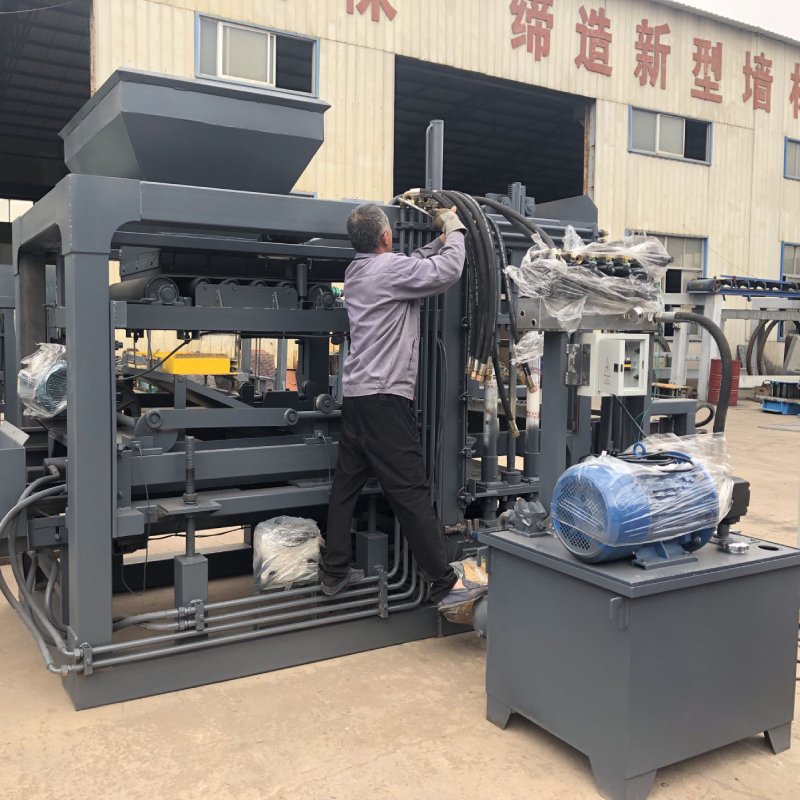
Image source :Aiweiblockmachine
Resilience Strategies for Full-Automatic Block Manufacturers in Economic Downturns
Title: Building Resilience: Strategies for Full-Automatic Block Manufacturers in Economic Downturns
Introduction
Economic downturns can present significant challenges to businesses across various industries, including full-automatic block manufacturing. In times of economic uncertainty, resilience becomes a key factor in ensuring the continued success and sustainability of manufacturing operations. This article explores strategies for full-automatic block manufacturers to build resilience and navigate the complexities of economic downturns.
1. **Diversification of Product Offerings**
One fundamental strategy for resilience in economic downturns is diversification. Full-automatic block manufacturers can explore diversifying their product offerings to cater to a broader range of market demands. This may involve the development of specialized blocks for niche markets or the introduction of innovative products that address emerging needs in the construction industry. Diversification not only helps in mitigating the impact of economic fluctuations in specific sectors but also positions the manufacturer to capitalize on new opportunities.
2. **Market Research and Customer Insights**
Understanding market trends and customer preferences is crucial for resilience. Full-automatic block manufacturers should invest in comprehensive market research to identify potential shifts in demand, emerging construction trends, and evolving customer preferences. This information can inform strategic decisions, allowing manufacturers to proactively adjust their product portfolios and production strategies in response to changing market dynamics.
3. **Cost Management and Operational Efficiency**
During economic downturns, cost management becomes paramount for maintaining profitability. Full-automatic block manufacturers should conduct a thorough review of their operational processes to identify areas for cost optimization. This may involve renegotiating supplier contracts, optimizing energy consumption, and implementing lean manufacturing principles to enhance overall operational efficiency. Streamlining processes not only reduces costs but also improves the agility of the manufacturing operation.
4. **Supply Chain Resilience**
A resilient supply chain is essential for full-automatic block manufacturers, particularly during economic downturns. Assessing and diversifying suppliers, maintaining clear communication channels, and developing contingency plans for potential disruptions are key elements of supply chain resilience. Building strategic relationships with reliable suppliers and exploring local sourcing options can reduce dependency on specific regions and enhance the overall resilience of the supply chain.
5. **Financial Planning and Cash Flow Management**
Sound financial planning is a cornerstone of resilience in economic downturns. Full-automatic block manufacturers should develop robust financial models that account for various economic scenarios. This includes maintaining healthy cash reserves, optimizing inventory levels, and managing accounts receivable efficiently. Effective cash flow management ensures that the business can weather financial challenges and continue operations even in challenging economic conditions.
6. **Investment in Technology and Innovation**
Technological advancements can play a pivotal role in building resilience for full-automatic block manufacturers. Investing in state-of-the-art technology not only enhances production efficiency but also positions the manufacturer for future competitiveness. Automation, predictive maintenance, and data analytics can optimize production processes, reduce costs, and provide valuable insights for informed decision-making during economic downturns.
7. **Customer Relationship Management and Service Excellence**
Maintaining strong relationships with customers is crucial for resilience. Full-automatic block manufacturers should prioritize customer satisfaction through service excellence and responsive communication. Offering value-added services, such as training programs, technical support, and customized solutions, fosters loyalty and can contribute to the stability of customer relationships even in challenging economic climates.
8. **Government and Industry Collaboration**
Engaging with government initiatives and industry collaborations can provide additional support for full-automatic block manufacturers. Participation in economic stimulus programs, leveraging tax incentives, and collaborating with industry associations can offer resources and insights that contribute to resilience. Additionally, staying informed about regulatory changes and industry trends is essential for adapting strategies to external factors.
Conclusion
In the face of economic downturns, full-automatic block manufacturers can proactively build resilience by embracing a holistic approach. Diversification, market intelligence, cost management, supply chain resilience, financial planning, technological innovation, customer relationship management, and collaborative efforts with government and industry stakeholders collectively form a robust strategy for navigating economic challenges. By adopting these resilience-building strategies, full-automatic block manufacturers can not only weather economic downturns but also emerge stronger and well-positioned for long-term success in the dynamic manufacturing landscape.
